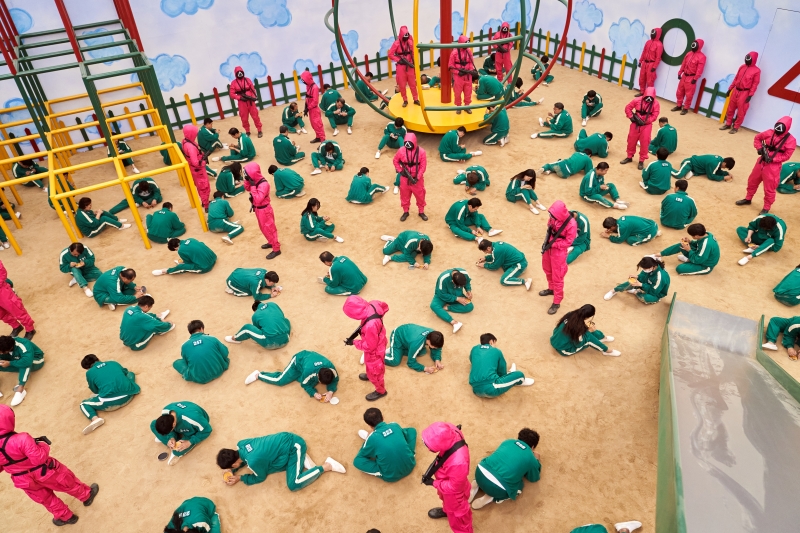Netflix’s new successful TV show Squid Game offers a bleak window into an unfair capitalistic Korean society, where people are willing to risk their life to repay their debt, while showing all the facets and fragility of humankind.
By Silvia Vacchelli
Picture: Netflix
If you haven’t heard of the new Netflix show Squid Game, it’s probably because you live under a rock. For the last several weeks people on social media have been talking about nothing else, from the thousands Tik Tok videos where they tried to recreate the famous Dalgona candy to Instagram posts and even ads on Spotify. Squid Game seemed impossible to ignore, so I decided to watch it to understand what all the hype was about, and I was not disappointed.
Trigger Warning
If you are not a fan of violence and splatter films, then the show is not for you. However, if you are able to pass over the strong visual scenes, I can assure you that it is much more than a gory tv-show. The story is set in present day South Korea and it focuses on a secret contest in which 456 players, recruited in the streets of Seoul, have to complete different children’s games in order to win a final prize of 45.6 billion Won (approximately 33 million Euros). Most of the players are desperate people burdened with crippling debt and they consider the game their only chance for a new life. However, only one person can win the final prize and those who lose are executed each round and their bodies disposed of.
Why Do People Like It So Much?
The idea of a mortal game is not very original, it was already used many times from the horror movie Saw to the dystopian Hunger Games, however Squid Game manages to give an original twist to it. The participants in the game are not forced to risk their life because of an external agent’s decision but they are doing it so (more-or-less) willingly. The players have to sign a consent form and the third rule states that the games »may be terminated upon a majority vote«. The game has therefore been created by the mind of a sadist, but it is somewhat democratic, and the players are choosing to pay the price of their own life. Even if, needless to say, in a less individualistic and more equal society citizens would never be forced to take such drastic decisions for financial reasons.

Most viewers like the TV show because of both the thrill and excitement of the games, not knowing what the next challenge will be and who will survive at the end, and the surreal and almost dreamlike (or rather, nightmare-like) atmosphere. Yet, what draw me in were the well-rounded characters: even if the players are initially reduced to the number on their uniform, they are very different from one another. There are no absolute villain nor saints and they all have their fragility in common. There is an empathic man who is paradoxically a terrible father and son, an old man who has nothing to lose anymore, a ruthless cheater crushed by high expectations, a sister trying to create a better future for her brother, a pastor who believes God will help him, and many other relatable characters whose lives outside the game are more unbearable than inside it. All these characters are put in front of their failures in life, and are brought to the limit in order to face them. The difference with other »mortal game shows« is that Squid Game shows us the variety of the human spectrum and doesn’t instil fear but makes its viewers feel sorry for the characters’ destiny and the terrible choices they have to make.
Society Is Unfair
The masked frontman of the games declares in episode 5: »Players compete in a fair game under the same condition. These people suffered from inequality and discrimination out in the world, and we offer them one last chance to fight on equal footing and win«. Even if the actual fairness of the games if questionable, I believe that this sentence portrays the principle of the show well: »Society is unfair«. This statement can be applied to probably every country, but it is particularly relevant in the case of modern South Korea since economic inequality has become one of the biggest issues. Low-income earners make up for 40% of the society, while 1 in 10 young adults is unemployed. The pension system is terrible so that, as we see in the show, many elderly people are forced to work well in to their 80s and struggle to afford rent and hospital care. Moreover, the price of houses is skyrocketing and many resolve to getting mortgages they are not able to repay.
Squid Game
South Korea 2021
1 season, 9 episodes
Idea: Hwang Dong-hyuk
Starring: Lee Jung-jae,Park Hae-soo, Wi Ha-jun, and others
The show aims to criticize capitalistic society and the sense of isolation and selfishness that it creates, where individuals are willing to sacrifice other people’s life to earn money. It displays the darkest side of mankind and makes the desperate cry of one of the players »How can you call yourselves human?« resonate in our mind. However, in this very bleak portray of South Korea there are some tiny sparks of light with players that create real bonds of friendship and are willing to help each other up to the point of sacrificing their life to let the others win.
I might be overly optimistic but the message I got from Squid Game is that society is terrible, but humans are not. They are flawed, fragile and selfish but there will always be someone who cares and is willing to fight back.






